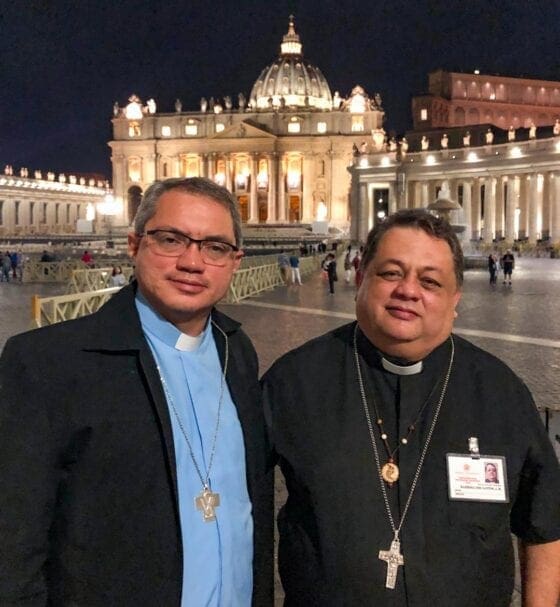On October 6, we began the special Synod for the Amazon, which will run until the 27th of this same month.
The Synod Assembly is attended by 28 cardinals, 29 archbishops, 62 titular bishops, 7 auxiliary bishops, 27 apostolic vicars, 10 prelate bishops and 21 non-bishops (priests, religious and laity).
 Among the Brazilian bishops, there are two of us who are of the Congregation of the Mission: Bishop Evaldo Carvalho, from the diocese of Viana, in the state of Maranhão, and Bishop Fernando Barbosa, from the Prelature of Tefé, in the state of Amazonas.
Among the Brazilian bishops, there are two of us who are of the Congregation of the Mission: Bishop Evaldo Carvalho, from the diocese of Viana, in the state of Maranhão, and Bishop Fernando Barbosa, from the Prelature of Tefé, in the state of Amazonas.
Obviously, we are not directly representing the Congregation in the Synod, but we do not cease to be a Vincentian presence in this Synod, since the charism of St. Vincent de Paul has left its mark on our missionary identity.
The starting point for the whole set of discussions of the Synod is the socio-environmental crisis, that is, the ecological crisis, the climatic crisis caused by the devastation and degradation of the forest. The result of this aggression against nature is a social crisis, which generates poverty and misery, affecting mainly the natives, those who live on the banks of the rivers (the riverside), the descendants of the African slaves (quilombolas), and the small farmers.
In the Encyclical Ladauto si ’, Pope Francis affirms that everything is inter-related: human beings and nature. The damage we cause to nature ends up destroying us as human beings.
In Puerto Maldonado, Peru, in his speech to the indigenous peoples, on January 19, 2018, Pope Francis declared, “Probably, the original Amazonian peoples were never as threatened in their territories as they are now.”
The question to which we are called to respond in this Synod is “what answers can we give to this situation?” Or, in other words, what paths of evangelization should we point out in the face of an economic system that destroys the forest, pollutes the rivers, invades the lands, expels the original peoples from their lands and kills them?
The Church in mission in the Amazon cannot be oblivious to this serious situation. Therefore, the Church understands that caring for the common house is part of its mission. Indeed, the Amazon is a territory where the Church is called to make present the Kingdom of God.
In that sense, we also reflect on the Amazonian face of the Church, based on its preferential option for and with the poor, addressing issues such as ministries, the role of women, the celebration of the sacraments in the most distant communities, especially the Eucharist
The theme of this Synod is new paths for the Church and for holistic ecology. Thus, we will together try to find appropriate answers for the great pastoral and social challenges of the pan-Amazon region.
We do not meet here in Rome to offer all embracing answers to the problems of the Amazon. In process that is particular to a synod, that is, walking together, we want to hear the cry of the earth and the cry of the poor, in order to discern what new paths the Holy Spirit points out to the Pan-Amazon region.
We participate with great hope in this Synod, as bishops and children of St. Vincent, grateful for the opportunity to share the challenges and perspectives of the region and with the audacity to open new paths for the Good News of the Kingdom to use to reach the peripheries of the world.
May St. Vincent de Paul and our missionary saints intercede for this ecclesial event so that, in respect for the beauty of Creation, all the peoples of the earth praise God, and enlightened by Him, they walk paths of justice and peace, as Pope Francis affirms in the convening of this Special Assembly for the Pan-Amazon region.
Bishop Evaldo Carvalho, CM
Diocese of Viana

